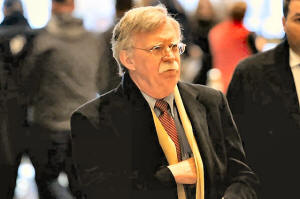|
Trump's new security adviser known for
clashes with spy agencies
 Send a link to a friend
Send a link to a friend
 [March 24, 2018]
By Jonathan Landay and Warren Strobel [March 24, 2018]
By Jonathan Landay and Warren Strobel
WASHINGTON (Reuters) - Incoming White House
national security adviser John Bolton's history of clashes with U.S.
intelligence agencies suggests how he might handle North Korea and Iran,
two of the thorniest challenges he and U.S. President Donald Trump face.
Bolton takes over on April 9 from retiring Army Lt. Gen. H. R. McMaster.
Based on his public statements, he shares Trump's dislike of the Iran
nuclear deal and often-bellicose stance toward North Korea.
However, his pronouncements on both issues are at odds with the
assessments of U.S. intelligence agencies.
In a 2017 article in the conservative National Review, Bolton accused
Iran of "significant violations" of the 2015 nuclear accord curbing the
Islamic Republic's nuclear program.
U.S. Director of National Intelligence Dan Coats, however, told Congress
in February that Tehran has been in compliance with the deal, which is
working as designed.

Bolton has characterized North Korea's nuclear and ballistic missile
programs as a threat best eliminated by a pre-emptive military strike.
U.S. intelligence analysts have warned that such a strike would trigger
a North Korean counterattack that would kill tens of thousands of South
Koreans, American troops and civilians, and others as far away as Japan.
As a senior State Department official from 2001 to 2005, Bolton
exaggerated what the U.S. government knew about weapons programs in
Iraq, Cuba and Syria, and retaliated against analysts who differed with
him, according to intelligence officials involved in the events.
"The question is, is he (Bolton) going to be like that, and start with
the answer and shoehorn the intelligence to fit," or take a more
balanced view, said a former CIA official with more than 30 years'
experience.
The official, who spoke on condition of anonymity, reflected many
intelligence veterans' wariness at Bolton's appointment.
Bolton declined comment via a spokesman. A CIA spokeswoman also declined
comment.
Bolton, 69, is known as a dedicated hawk who marries bureaucratic savvy
with belligerent rhetoric.
The decisions the White House confronts on North Korea and Iran require,
officials say, complicated judgments based on imperfect information
about the status of secret weapons programs, conditions that Bolton's
critics say he has seized on in the past to promote his own agenda.
'NOT REFLECTED BY INTELLIGENCE'
During President George W. Bush's first term in office, Bolton was the
State Department's top official on weapons proliferation.
[to top of second column]
|

Former U.S. Ambassador to the United Nations John Bolton arrives for
a meeting with U.S. President-elect Donald Trump at Trump Tower in
New York, U.S., December 2, 2016. REUTERS/Mike Segar/File Photo

In a May 2002 speech, he declared that Cuba had "at least a limited
offensive biological warfare research and development effort," and
was sharing the technology with other countries.
Greg Theilmann, a top State Department intelligence official at the
time, recounted how Bolton tried to retaliate against one of
Theilmann's analysts for disputing that conclusion.
"Bolton wanted to make charges about Cuban biological warfare
capabilities which were not reflected by the intelligence,"
Theilmann said in a telephone interview.
Bolton tried to have analyst Christian Westermann reassigned for
challenging him, but he and Carl Ford, the head of the State
Department's intelligence bureau, refused, Theilmann said.
In his 2007 memoir, "Surrender is Not an Option," Bolton wrote that
the language on Cuba's bioweapons programs had been approved by U.S.
intelligence agencies. Westermann, he wrote, "was attempting to
impose his own policy views," which intelligence analysts are not
supposed to do.
Fulton Armstrong, who was the intelligence community's top Cuba
expert, said Bolton and several of his associates in government also
tried to have him removed over the biological weapons issue.

Bolton "showed every despicable trait of an obsessed policy person
who, when frustrated in his attempts to cook the intelligence,
lashed out at the person delivering the news," Armstrong said.
Bolton crossed swords with U.S. spy agencies again in July 2003,
when the CIA and other agencies objected to testimony he planned to
give describing Syria's development of biological, chemical and
nuclear weapons as a threat to Middle East stability.
(Additional reporting by Mark Hosenball; Editing by John Walcott and
James Dalgleish)
[© 2018 Thomson Reuters. All rights
reserved.]
Copyright 2018 Reuters. All rights reserved. This material may not be published,
broadcast, rewritten or redistributed.
Thompson Reuters is solely responsible for this content. |